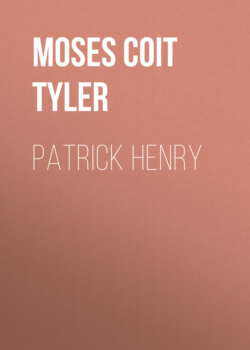Читать книгу Patrick Henry - Moses Coit Tyler - Страница 16
На сайте Литреса книга снята с продажи.
FOOTNOTES:
ОглавлениеTable of Contents
[57] Wirt, 24.
[58] Meade, Old Families and Churches of Va. i. 220.
[59] Maury, Mem. of a Huguenot Fam. 423.
[60] Wirt, 39–41.
[61] Mem. by Jefferson, in Hist. Mag. for 1867, 91.
[62] Jefferson’s Works, vi. 365.
[63] Mem. by Jefferson, in Hist. Mag. for 1867, 91.
[64] These documents are given in full in the Appendix to Wirt’s Life of Henry, as Note A.
[65] Jour. Va. House of Burgesses.
[66] Of this famous series of resolutions, the first five are here given precisely as they are given in Patrick Henry’s own certified copy still existing in manuscript, and in the possession of Mr. W. W. Henry; but as that copy evidently contains only that portion of the series which was reported from the committee of the whole, and was adopted by the House, I have here printed also what I believe to have been the preamble, and the last two resolutions in the series as first drawn and introduced by Patrick Henry. For this portion of the series, I depend on the copy printed in the Boston Gazette, for July 1, 1765, and reprinted in R. Frothingham, Rise of the Republic, 180 note. In Wirt’s Life of Henry, 56–59, is a transcript of the first five resolutions as given in Henry’s handwriting: but it is inaccurate in two places.
[67] Mem. by Jefferson, in Hist. Mag. for 1867, 91.
[68] Mem. by Jefferson, in Hist. Mag. for 1867, 91. Henry was aided in this debate by Robert Munford, also, and by John Fleming: W. W. Henry, Life, Corr. and Speeches of P. Henry, i. 82n.
[69] For this splendid anecdote we are indebted to Judge John Tyler, who, then a youth of eighteen, listened to the speech as he stood in the lobby by the side of Jefferson. Edmund Randolph, in his History of Virginia, still in manuscript, has a somewhat different version of the language of the orator, as follows: “ ‘Cæsar had his Brutus, Charles the First, his Cromwell, and George the Third’—‘Treason, Sir,’ exclaimed the Speaker; to which Mr. Henry instantly replied, ‘and George the Third, may he never have either.’ ” The version furnished by John Tyler is, of course, the more effective and characteristic; and as Tyler actually heard the speech, and as, moreover, his account is confirmed by Jefferson who also heard it, his account can hardly be set aside by that of Randolph who did not hear it, and was indeed but a boy of twelve at the time it was made. L. G. Tyler, Letters and Times of the Tylers, i. 56; Wirt, 65.
[70] Mem. by Jefferson, Hist. Mag. for 1867, 91.
[71] Campbell, Hist. Va. 542.
[72] The subject of the Virginia resolutions presents several difficulties which I have not thought it best to discuss in the text, where I have given merely the results of my own rather careful and repeated study of the question. In brief, my conclusion is this: That the series as given above, consisting of a preamble and seven resolutions, is the series as originally prepared by Patrick Henry, and introduced by him on Wednesday, May 29, in the committee of the whole, and probably passed by the committee on that day; that at once, without waiting for the action of the House upon the subject, copies of the series got abroad, and were soon published in the newspapers of the several colonies, as though actually adopted by the House; that on Thursday, May 30, the series was cut down in the House by rejection of the preamble and the resolutions 6 and 7, and by the adoption of only the first five as given above; that on the day after that, when Patrick Henry had gone home, the House still further cut down the series by expunging the resolution which is above numbered as 5: and that, many years afterwards, when Patrick Henry came to prepare a copy for transmission to posterity, he gave the resolutions just as they stood when adopted by the House on May 30, and not as they stood when originally introduced by him in committee of the whole on the day before, nor as they stood when mutilated by the cowardly act of the House on the day after. It will be noticed, therefore, that the so-called resolutions of Virginia, which were actually published and known to the colonies in 1765, and which did so much to fire their hearts, were not the resolutions as adopted by the House, but were the resolutions as first introduced, and probably passed, in committee of the whole; and that even this copy of them was inaccurately given, since it lacked the resolution numbered above as 3, probably owing to an error in the first hurried transcription of them. Those who care to study the subject further will find the materials in Prior Documents, 6, 7; Marshall, Life of Washington, i. note iv.; Frothingham, Rise of the Republic, 180 note; Gordon, Hist. Am. Rev., i. 129–139; Works of Jefferson, vi. 366, 367; Wirt, Life of Henry, 56–63; Everett, Life of Henry, 265–273, with important note by Jared Sparks in Appendix, 391–398. It may be mentioned that the narrative given in Burk, Hist. Va., iii. 305–310, is untrustworthy.
[Pg 77] ToC
